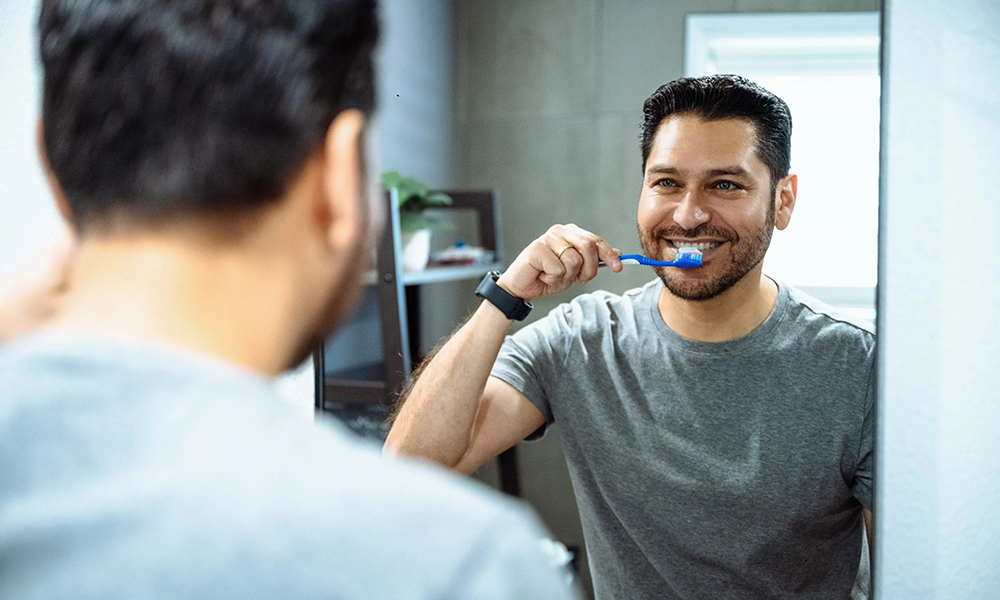
世界上有兩種人:一種是在早餐前刷牙,另一種是在早餐后刷牙,。那么,,哪一種才是正確的呢?和大多數(shù)健康相關(guān)的問(wèn)題一樣,,答案視情況而定,。
什么時(shí)候是刷牙的最佳時(shí)間?
雖然牙科界對(duì)此看法不一,,但鳳凰城的牙醫(yī)約森·蓋斯特魯姆博士(在TikTok上以@doctorjossen為人熟知)主張?jiān)谠绮颓八⒀馈?/p>
蓋斯特魯姆博士對(duì)《財(cái)富》雜志表示:“我認(rèn)為,,早餐前刷牙有助于在牙齒表面形成一層保護(hù)層,還能在吃早餐前刺激唾液分泌,。當(dāng)你睡覺(jué)時(shí),,唾液分泌會(huì)減少,,很多人因各種原因會(huì)在夜間感到口干。唾液有助于中和口腔中的酸性環(huán)境,。這意味著你早上醒來(lái)時(shí),,由于唾液分泌減少,牙齒更容易受到酸性侵蝕,,更不用說(shuō)還有早晨的口氣問(wèn)題,。”
但如果你堅(jiān)持在吃完早餐后刷牙,,蓋斯特魯姆博士建議至少等30分鐘再刷,,因?yàn)槭澄锖惋嬃现械乃幔ㄓ绕涫强Х龋┛赡軙?huì)損害牙釉質(zhì)。而美國(guó)牙科協(xié)會(huì)(American Dental Association)則建議飯后至少等一小時(shí)再刷牙,。
蓋斯特魯姆博士表示:“唾液大約需要30分鐘來(lái)緩沖口腔中的酸性,,使其恢復(fù)到安全水平。在此期間,,你可以用水或像TheraBreath這樣的堿性漱口水漱口,,幫助中和口腔中的酸性,直到唾液發(fā)揮作用,。”
刷牙的頻率
你應(yīng)該每天至少刷兩次牙:早上一次,,睡前一次,。
蓋斯特魯姆博士表示:“我認(rèn)為這兩次同樣重要,,但睡前刷牙尤其關(guān)鍵,,因?yàn)槟阋宄惶熘蟹e累的牙菌斑。我喜歡對(duì)孩子們(還有一些成年人)說(shuō):晚上刷牙是為了保護(hù)牙齒,,早上刷牙是為了保持友誼,。”
如果你想在午餐后多刷一次牙,,蓋斯特魯姆博士建議飯后等30分鐘再刷,,以避免將食物中的酸刷進(jìn)牙齒。但要記住,,刷牙次數(shù)的增加并不意味著口腔更健康,。
“我想大多數(shù)人的第一反應(yīng)是,刷得越多越好,。我同意,,通過(guò)機(jī)械方式清除牙菌斑是預(yù)防蛀牙和改善牙齦健康的最佳方法,但只要你早晚刷得徹底,,就沒(méi)有必要過(guò)度刷牙,?!?蓋斯特魯姆博士這樣說(shuō)道。
刷牙的最佳方式
大多數(shù)牙醫(yī)推薦使用軟毛或超軟毛牙刷,。成年人應(yīng)使用豌豆大小的牙膏,,將牙刷以45度角朝向牙齦,短距離來(lái)回刷動(dòng),,確保清潔每一顆牙齒。過(guò)于用力刷牙可能會(huì)導(dǎo)致牙齦萎縮和牙釉質(zhì)磨損,。
蓋斯特魯姆博士指出:“如果你使用電動(dòng)牙刷,要非常輕柔地用力,,將牙刷以45度角朝向牙齦,沿著牙齒的外側(cè)和內(nèi)側(cè)表面輕輕滑動(dòng),,然后直接刷牙齒的咬合面。讓電動(dòng)牙刷自己完成工作——這正是你買它的原因,?!?/p>
另外,,你還需要每三到四個(gè)月更換一次牙刷,,或者在你生病后立即更換,。
保護(hù)牙齒的其他方法
良好的口腔健康也是整體健康的指標(biāo)。最近,,研究人員將牙齦疾病與心血管疾病,、糖尿病,、癡呆癥,、阿爾茨海默病,甚至勃起功能障礙聯(lián)系起來(lái),。
除了定期刷牙,,使用牙線對(duì)于保持牙齦的最佳健康狀態(tài)也很重要。每天至少使用一次牙線可以幫助減少牙齒間產(chǎn)生蛀牙的幾率,。
蓋斯特魯姆博士表示:“水牙線,,例如Waterpik,也是很好的輔助工具,,能顯著改善牙齦健康,,特別適用于手部靈活性較差的患者。舌苔清潔也是一個(gè)常被低估的重要步驟,,有助于減少口腔中的有害細(xì)菌,。”
雖然含酒精的漱口水可能會(huì)使口腔干燥,,但在刷牙前五分鐘使用漱口水可以有效對(duì)抗晨間口氣,。
如果你難以堅(jiān)持規(guī)律的刷牙習(xí)慣,蓋斯特魯姆博士建議選擇一種你喜歡的牙膏味道,;購(gòu)買一把電動(dòng)牙刷(許多電動(dòng)牙刷都有內(nèi)置計(jì)時(shí)器,,幫助你準(zhǔn)確知道刷牙時(shí)間);或者與朋友,、家人或室友一起刷牙,。
他表示:“這有助于建立聯(lián)系,也能激勵(lì)你養(yǎng)成持續(xù)的習(xí)慣,?!保ㄘ?cái)富中文網(wǎng))
翻譯:劉進(jìn)龍
審校:汪皓
世界上有兩種人:一種是在早餐前刷牙,另一種是在早餐后刷牙,。那么,,哪一種才是正確的呢?和大多數(shù)健康相關(guān)的問(wèn)題一樣,,答案視情況而定,。
什么時(shí)候是刷牙的最佳時(shí)間?
雖然牙科界對(duì)此看法不一,,但鳳凰城的牙醫(yī)約森·蓋斯特魯姆博士(在TikTok上以@doctorjossen為人熟知)主張?jiān)谠绮颓八⒀馈?/p>
蓋斯特魯姆博士對(duì)《財(cái)富》雜志表示:“我認(rèn)為,早餐前刷牙有助于在牙齒表面形成一層保護(hù)層,,還能在吃早餐前刺激唾液分泌,。當(dāng)你睡覺(jué)時(shí),唾液分泌會(huì)減少,,很多人因各種原因會(huì)在夜間感到口干,。唾液有助于中和口腔中的酸性環(huán)境。這意味著你早上醒來(lái)時(shí),,由于唾液分泌減少,,牙齒更容易受到酸性侵蝕,,更不用說(shuō)還有早晨的口氣問(wèn)題?!?/p>
但如果你堅(jiān)持在吃完早餐后刷牙,蓋斯特魯姆博士建議至少等30分鐘再刷,,因?yàn)槭澄锖惋嬃现械乃幔ㄓ绕涫强Х龋┛赡軙?huì)損害牙釉質(zhì),。而美國(guó)牙科協(xié)會(huì)(American Dental Association)則建議飯后至少等一小時(shí)再刷牙。
蓋斯特魯姆博士表示:“唾液大約需要30分鐘來(lái)緩沖口腔中的酸性,,使其恢復(fù)到安全水平,。在此期間,,你可以用水或像TheraBreath這樣的堿性漱口水漱口,幫助中和口腔中的酸性,,直到唾液發(fā)揮作用?!?/p>
刷牙的頻率
你應(yīng)該每天至少刷兩次牙:早上一次,,睡前一次。
蓋斯特魯姆博士表示:“我認(rèn)為這兩次同樣重要,,但睡前刷牙尤其關(guān)鍵,因?yàn)槟阋宄惶熘蟹e累的牙菌斑,。我喜歡對(duì)孩子們(還有一些成年人)說(shuō):晚上刷牙是為了保護(hù)牙齒,,早上刷牙是為了保持友誼?!?/p>
如果你想在午餐后多刷一次牙,,蓋斯特魯姆博士建議飯后等30分鐘再刷,以避免將食物中的酸刷進(jìn)牙齒,。但要記住,,刷牙次數(shù)的增加并不意味著口腔更健康。
“我想大多數(shù)人的第一反應(yīng)是,,刷得越多越好,。我同意,,通過(guò)機(jī)械方式清除牙菌斑是預(yù)防蛀牙和改善牙齦健康的最佳方法,但只要你早晚刷得徹底,,就沒(méi)有必要過(guò)度刷牙,。” 蓋斯特魯姆博士這樣說(shuō)道,。
刷牙的最佳方式
大多數(shù)牙醫(yī)推薦使用軟毛或超軟毛牙刷,。成年人應(yīng)使用豌豆大小的牙膏,將牙刷以45度角朝向牙齦,,短距離來(lái)回刷動(dòng),,確保清潔每一顆牙齒。過(guò)于用力刷牙可能會(huì)導(dǎo)致牙齦萎縮和牙釉質(zhì)磨損,。
蓋斯特魯姆博士指出:“如果你使用電動(dòng)牙刷,,要非常輕柔地用力,將牙刷以45度角朝向牙齦,,沿著牙齒的外側(cè)和內(nèi)側(cè)表面輕輕滑動(dòng),,然后直接刷牙齒的咬合面。讓電動(dòng)牙刷自己完成工作——這正是你買它的原因,?!?/p>
另外,你還需要每三到四個(gè)月更換一次牙刷,,或者在你生病后立即更換,。
保護(hù)牙齒的其他方法
良好的口腔健康也是整體健康的指標(biāo)。最近,,研究人員將牙齦疾病與心血管疾病,、糖尿病、癡呆癥,、阿爾茨海默病,,甚至勃起功能障礙聯(lián)系起來(lái)。
除了定期刷牙,,使用牙線對(duì)于保持牙齦的最佳健康狀態(tài)也很重要,。每天至少使用一次牙線可以幫助減少牙齒間產(chǎn)生蛀牙的幾率。
蓋斯特魯姆博士表示:“水牙線,,例如Waterpik,,也是很好的輔助工具,能顯著改善牙齦健康,,特別適用于手部靈活性較差的患者,。舌苔清潔也是一個(gè)常被低估的重要步驟,有助于減少口腔中的有害細(xì)菌?!?/p>
雖然含酒精的漱口水可能會(huì)使口腔干燥,,但在刷牙前五分鐘使用漱口水可以有效對(duì)抗晨間口氣。
如果你難以堅(jiān)持規(guī)律的刷牙習(xí)慣,,蓋斯特魯姆博士建議選擇一種你喜歡的牙膏味道,;購(gòu)買一把電動(dòng)牙刷(許多電動(dòng)牙刷都有內(nèi)置計(jì)時(shí)器,幫助你準(zhǔn)確知道刷牙時(shí)間),;或者與朋友,、家人或室友一起刷牙。
他表示:“這有助于建立聯(lián)系,,也能激勵(lì)你養(yǎng)成持續(xù)的習(xí)慣,。”(財(cái)富中文網(wǎng))
翻譯:劉進(jìn)龍
審校:汪皓
There are two types of people in the world: those who brush their teeth before breakfast and those who brush their teeth after breakfast. But which group is right? Well, like most health-related questions, it depends.
When is the best time to brush your teeth?
While there are varying opinions within the dental community, Dr. Jossen Gastelum, a Phoenix-based dentist better known as @doctorjossen on TikTok, is a proponent of brushing your teeth before breakfast.
“In my opinion, brushing your teeth before breakfast helps to add a protective coating onto your teeth and can even help to stimulate your saliva before you eat breakfast,” Gastelum tells Fortune. “When you’re sleeping, your salivary flow decreases, and many people experience dry mouth for various reasons. Saliva helps to buffer out the acidity in your mouth. This means that your teeth are more prone to acid attacks in the morning right when you wake up—not to mention morning breath, too.”
But if you insist on brushing your teeth after your first meal of the day, Gastelum suggests waiting at least 30 minutes after you’ve finished eating, as the acids in your food and drinks (especially coffee) can damage the enamel, while the American Dental Association recommends waiting at least an hour after eating to brush your teeth.
“Your saliva takes about 30 minutes to buffer out the acids in your mouth back down to safe levels,” he says. “In the interim, you can swish with either water or an alkaline mouth rinse like TheraBreath to help neutralize the acids in your mouth while your saliva gets to work.”
How often to brush your teeth
You should aim to brush your teeth at least twice a day: once in the morning and once before going to bed.
“Both times are equally important in my opinion, but before bed is especially crucial because you want to brush away all the plaque accumulated during the day,” says Gastelum. “I like to tell kids (and some adults): You brush your teeth at night to keep your teeth, and you brush your teeth in the morning to keep your friends.”
If you want to squeeze in a midday toothbrushing, say, after lunch, Gastelum recommends waiting 30 minutes after your meal to avoid brushing acids into your teeth. But keep in mind that more brushing doesn’t automatically equate to better oral health.
“I think most people’s first instinct is that the more they brush, the better,” he says. “I agree that mechanical disruption of plaque is the best way to prevent cavities and improve gum health, but it is not necessary to obsessively brush as long as you’re doing it well in the morning and at night before bed.”
The best way to brush your teeth
A soft or extra soft toothbrush is recommended by most dentists. Adults should use a pea-size amount of toothpaste and hold the toothbrush at a 45-degree angle toward your gums while brushing back and forth in short strokes to get every tooth. Aggressive brushing can result in gum recession and enamel wear.
“If you have an electric toothbrush, use very gentle pressure and glide the toothbrush on each tooth at a 45-degree angle toward the gum on the outside and inside surfaces, and then straight onto the top surfaces of your teeth,” says Gastelum. “Let the brush do all the work—that’s what you bought it for.”
You’ll also want to change your toothbrush every three to four months, or anytime after you’ve been sick.
Other ways to protect your teeth
Good oral health is indicative of overall health as well. Recently, researchers have linked gum disease to cardiovascular disease, diabetes, dementia, Alzheimer’s disease, and even erectile dysfunction.
In addition to regular brushing, flossing is important for keeping your gums at optimal health. Flossing at least once a day can help reduce your chances of getting cavities in between your teeth.
“Water flossers, for example Waterpik, are great adjuncts as well, which really improve gum health, especially in patients with low dexterity,” says Gastelum. “Tongue scraping is also very underrated and important for reducing bad bacteria in your mouth.”
Using mouthwash five minutes before brushing your teeth can help counter morning breath, although alcohol-based mouthwash can dry out your mouth.
If you struggle with maintaining a consistent toothbrushing routine, Gastelum recommends finding a toothpaste flavor you’re excited to use; investing in an electric toothbrush (many of them include built-in timers so you know exactly how long to brush); and brushing with a friend, family member, or roommate.
“It helps build connections and also motivates you to make it a consistent habit,” he says.






